hellog〜英語史ブログ / 2024-02
01 02 03 04 05 06 07 08 09 10 11 12 13 14 15 16 17 18 19 20 21 22 23 24 25 26 27 28 29
2026 : 01 02 03 04 05 06 07 08 09 10 11 12
2025 : 01 02 03 04 05 06 07 08 09 10 11 12
2024 : 01 02 03 04 05 06 07 08 09 10 11 12
2023 : 01 02 03 04 05 06 07 08 09 10 11 12
2022 : 01 02 03 04 05 06 07 08 09 10 11 12
2021 : 01 02 03 04 05 06 07 08 09 10 11 12
2020 : 01 02 03 04 05 06 07 08 09 10 11 12
2019 : 01 02 03 04 05 06 07 08 09 10 11 12
2018 : 01 02 03 04 05 06 07 08 09 10 11 12
2017 : 01 02 03 04 05 06 07 08 09 10 11 12
2016 : 01 02 03 04 05 06 07 08 09 10 11 12
2015 : 01 02 03 04 05 06 07 08 09 10 11 12
2014 : 01 02 03 04 05 06 07 08 09 10 11 12
2013 : 01 02 03 04 05 06 07 08 09 10 11 12
2012 : 01 02 03 04 05 06 07 08 09 10 11 12
2011 : 01 02 03 04 05 06 07 08 09 10 11 12
2010 : 01 02 03 04 05 06 07 08 09 10 11 12
2009 : 01 02 03 04 05 06 07 08 09 10 11 12
2024-02-29 Thu
■ #5421. 最上級の -est は比較級の -er にもう1要素付け加わっただけ [superlative][comparison][adjective][suffix][reconstruction][indo-european][analogy]
へぇ,そうだったのか,という話題.
Fertig (34) によると,標題の通り,形容詞・副詞の最上級を標示する接尾辞 -est は,比較級の -er を基にした発展版ということらしい.
The superlative suffix -est, for example, is historically a combination of the ancestor of the -er comparative suffix (*-ôz-/*-iz- in proto-Germanic) followed by an originally separate *-to-.
もともとは *-ôz-/*-iz- と *-to- は別々の役割を果たす別々の接尾辞だったが,これが合わさる機会も多かったので,合わさった結果の形が1つの新しい接尾辞として理解されるようになったということだ.
これはちょうど現代英語で -ist と -ic が別々の接尾辞とみなされているが,合わさった -istic も1つの独立した接尾辞ととらえられ得る状況に比べられる.例えば cannibalistic において,切り出すべき接尾辞は -ist と -ic の2つと分析するよりも,-istic の1つと分析するほうが実際的だろう.というのは,*cannibalist という単語はないからだ.
これを教訓とすれば,比較級の -er は -ist に,最上級の -est は -istic に相当するということになろう.分かりやすいような分かりにくいような.
・ Fertig, David. Analogy and Morphological Change. Edinburgh: Edinburgh UP, 2013.
2024-02-28 Wed
■ #5420. 保坂道雄(著)『文法化する英語』(開拓社,2014年) --- 英語の文法化の入門書 [toc][review][grammaticalisation]
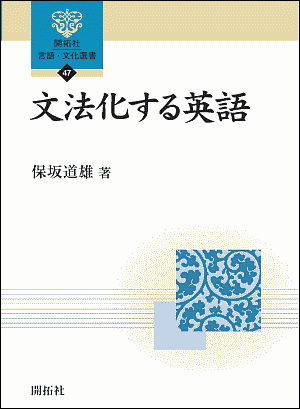
英語の文法化 (grammaticalisation) を学び始めたいという方に,標題の入門書をお薦めします.こちらの本については,先日の Voicy 「英語の語源が身につくラジオ (heldio)」でも取り上げました.「#1001. 英語の文法化について知りたいなら --- 保坂道雄(著)『文法化する英語』(開拓社,2014年)」です.ぜひお聴きください.
今朝配信した heldio でも「#1003. There is an apple on the table. --- 主語はどれ?」と題して,本書を参照しながら存在構文の謎についてのお話しをお届けしています.最近の heldio では他にも文法化にまつわる話題をシリーズで配信していますので「#5411. heldio で「文法化」を導入するシリーズをお届けしました」 ([2024-02-19-1]) のリンク集もご参照ください.
さて,『文法化する英語』で取り上げられている英語史上の文法化の事例はたいへんに豊富です.しかも重要な文法項目ばかりです.以下に掲げる目次を見ればわかるかと思います.
はしがき
第1章 文法化と英語
1. はじめに
2. 文法化とは何か
3. 英語の構造
4. 英語の歴史
5. 文法化を動かす「見えざる手」
第2章 冠詞の文法化
1. はじめに
2. 不定冠詞の歴史
3. 定冠詞の歴史
4. 冠詞の出現と文法化
第3章 存在構文における there の文法化
1. はじめに
2. There 構文の発達
3. 虚辞 there の出現と文法化
第4章 所有格の標識 -'s の文法化
1. はじめに
2. 所有格の標識 -'s の文法化
3. of 属格の発達
第5章 接続詞の文法化
1. はじめに
2. 並列構造から従属構造へ
2.1. 古英語における従属構造の発達
2.2. 多様な接続詞の発達
3. 接続詞の文法化
第6章 関係代名詞の文法化
1. はじめに
2. 古英語の関係代名詞
3. 関係代名詞 that の文法化
4. WH 関係代名詞の発達
第7章 再帰代名詞の文法化
1. はじめに
2. 古英語の再帰代名詞
3. 再帰代名詞の文法化
第8章 助動詞 DO の文法化
1. はじめに
2. 古英語の疑問文と否定文
3. DO の文法化
第9章 法助動詞の文法化
1. はじめに
2. 現代英語の法助動詞
3. 法助動詞の文法化
第10章 不定詞標識 to の文法化と準助動詞の発達
1. はじめに
2. 不定詞標識 to の文法化
3. for + 名詞句 + to 不定詞の発達
4. 準助動詞の文法化
4.1. be going to の文法化
4.2. have to の文法化
第11章 進行形の文法化
1. はじめに
2. 古英語の進行表現
3. 進行形の文法化
第12章 完了形の文法化
1. はじめに
2. 古英語の完了表現
2.1. HAVE 完了形
2.2. BE 完了形
3. 完了形の文法化
第13章 受動態の文法化
1. はじめに
2. 受動態の発達
3. 受動態の文法化
4. 二重目的語構文の受動態について
第14章 形式主語 it の文法化
1. はじめに
2. 非人称構文の衰退
3. 虚辞 it の文法化
第15章 文法化と言語進化
1. はじめに
2. 英語の多様な文法化
3. 文法化と構造変化
4. 言語の小進化
5. 英語の格と語順
6. おわりに
主要作品略語表
参考文献
さらなる研究のために
索引
本書は,この hellog でも何度か参照してきました.以下の記事もご覧いただければと思います.いずれにせよ『文法化する英語』は英語史の視点からの文法化の入門書としてイチオシです.
・ 「#2144. 冠詞の発達と機能範疇の創発」 ([2015-03-11-1])
・ 「#2146. 英語史の統語変化は,語彙投射構造の機能投射構造への外適応である」 ([2015-03-13-1])
・ 「#2490. 完了構文「have + 過去分詞」の起源と発達」 ([2016-02-20-1])
・ 「#3669. ゼミのグループ研究のための取っ掛かり書誌」 ([2019-05-14-1])
・ 「#5132. なぜ be going to は未来を意味するの? --- 「文法化」という観点から素朴な疑問に迫る」 ([2023-05-16-1])
・ 保坂 道雄 『文法化する英語』 開拓社,2014年.
2024-02-27 Tue
■ #5419. blending と contamination [blend][contamination][morphology][word_formation][terminology]
smoke と fog を掛け合わせた smog は,混成 (blending) と呼ばれる語形成によって生まれた混成語 (blend) の典型である.
一方,これと似た語形成のタイプとして混交 (contamination) がある.ラテン語 gravis (重い)が対義語の levis (軽い)の語形に影響されて,俗ラテン語で grevis へ変化したという例が挙げられる.また,混交には形態的な例だけでなく統語的な例も含まれる.例えば different from と other than が混じり合って different than が出力される事例がある.類例は「#630. blend(ing) あるいは portmanteau word の呼称」 ([2011-01-17-1]) や「#737. 構文の contamination」 ([2011-05-04-1]) で取り上げたので,そちらも参照されたい.
blending と contamination は,2つの要素の混じり合いに基づく過程としてよく似ている.実際,両者を特に区別しない研究者もいる.上記で私自身も2つの用語の和訳を「混成」と「混交」と異ならせてはみたが,各々の慣用的な訳語というわけではなく,あくまで英語での異なる用語遣いに沿わせてみたにすぎない.
では,両者を区別する研究者は,どこで区別しているのだろうか.この点について Fertig (62) を引用する.
The terms contamination and blending were introduced by different scholars (Hermann Paul and Henry Sweet, respectively) in the late nineteenth century to refer to roughly the same range of phenomena. Many historical linguists, if they use both terms at all, have continued to use them more or less interchangeably . . . , whereas most morphologists use blend(ing) to refer only to the type of deliberate creation of new lexical items illustrated by smog.
Fertig 自身は blend(ing) は contamination の1種とみなしており,次のように説明している.
I classify blends as a subtype of contamination. Exactly where to draw the line is tricky, but a prototypical blend has the following properties: (1) it is lexical, i.e. both the input forms and the product are words (rather than phrases or bound morphemes); (2) it is a deliberate creation; (3) the input words both (or all) contribute to the meaning of the blend.
このように解釈してもなおグレーゾーンの事例はあるようだが,一応のところ両者を区別して理解しておきたいと思う.
・ Fertig, David. Analogy and Morphological Change. Edinburgh: Edinburgh UP, 2013.
2024-02-26 Mon
■ #5418. A Dictionary of Japanese Loanwords の前書きを読んでみよう [review][loan_word][japanese][lexicography][lexicology][dictionary][inohota][notice][oed]
昨日,「いのほたチャンネル」(旧「井上逸兵・堀田隆一英語学言語学チャンネル」)の最新動画が公開されました.「最初の日本語由来の英語は?いまや hikikomori や enjo kosai も!---外来語の諸相-「ナイター」「柿」【井上逸兵・堀田隆一英語学言語学チャンネル 第209回】」です.英語に入った日本語単語の歴史を概説しています.馴染み深い日本語が多く出てくるので,入りやすい話題かと思いますが,れっきとした英語史の話題です.
動画内では典拠として OED のほか,A Dictionary of Japanese Loanwords というおもしろい辞書を用いており,紹介もしています.この辞書については,最近の hellog でも「#5410. A Dictionary of Japanese Loanwords --- 英語に入った日本語単語の辞書」 ([2024-02-18-1]) にて取り上げていますので,そちらもご一読ください.

同辞書の冒頭の説明書きを読んでみましょう (ix--x) .
A Dictionary of Japanese Loanwords is a lexical index of terms borrowed from the Japanese language that are listed in standard English dictionaries and in publications that analyze new words. Therefore, this dictionary covers both the loanwords that have withstood the test of time and those whose test has just started.
American standard dictionaries keep records of borrowings from the Japanese language; most of them, however, do not furnish quotations. A Dictionary of Japanese Loanwords adds a special contribution by providing illustrative quotations from many entries. These quotations were collected from books, newspapers, magazines, advertisements, and databases, all of which were published or distributed in the United States between 1964 and 1995. They give details about the entry, demonstrate how it is used in a natural context, and indicate the degree of its assimilation into American English.
Recent studies report that Japanese is the second most productive source of new loanwords to English, which indicates that the English-speaking world is paying attention to Japan more closely than ever before. The entries and illustrative quotations present the aspects of Japan that Americans have been exposed to and have adopted. Karaoke, for example, first appeared in English in 1979, when English-speaking societies observed and read about a karaoke fever in Japan. Today, Americans find themselves enjoying karaoke. Karaoke showcase, a weekly television talent contest, appeared on 120 U.S. stations in June 1992. A phenomenon like this is shown in this book in the form of lexical entries.
The impact that Japan has made on America covers all aspects of life: aesthetics, architecture, arts and crafts, astronomy, biology, botany, business management, clothing, economics, education, electronics, fine art, food and food technology, medicine, oceanography, pathology, philosophy, physics, politics, religion, sports, technology, trade, weaponry, zoology, and so on. Some entries are not accompanied by a quotation; nevertheless, when dictionaries record words they indicate that these words are somehow linked to people's everyday lives. A Dictionary of Japanese Loanwords is also meant to be fun to read. I hope that it will provide the meaning for Japanese words the reader has come across on many occasions, and that it will be an occasion for happy browsing.
この辞書の魅力は,何よりも引用文が豊富なところ.まさに "happy browsing" に最適な「読める辞書」です.
・ Toshie M. Evans, ed. A Dictionary of Japanese Loanwords. Westport, Conn.: Greenwood, 1997.
2024-02-25 Sun
■ #5417. 表記体系は母語話者による言語学的分析の結果である [history_of_linguistics][writing][linguistics][grammatology][medium]
ある言語を書き取る文字やその書き言葉の体系は,それ自体がその言語の話し言葉を対象とした言語学の1つの形である.言語を意識的に分析することなしに,人は文字や表記体系を考案することはできないからだ.そして,それを読み書きする能力を後から身につけた人もまた,間接的に考案者の言語分析を追体験することになるからだ.
Daniels (54) は「言語学史としての書き言葉の歴史」のなかで,次のように述べている.
Ordinarily, speakers have no insight into the nature of their language or what they are doing when they are speaking. But when a language is written, it is consciously written, and every writing system embodies an analysis of its languages. And that analysis is known not only to the deviser of the writing system (however great an accomplishment the act of devising a writing system may be), but also---consciously---to everyone who learns to write, and even read, that writing system. Ergo, every writing system informs us of 'native speaker analysis' of every written language, and such analyses have touched on virtually every level of analysis known to modern linguistics.
書き言葉の発明は,それ自身が話し言葉の言語学的分析の証拠とみなすことができる.したがって,言語学史書の最初に置かれるべき話題である.なるほど,その通り.
・ Daniels, Peter T. "The History of Writing as a History of Linguistics." Chapter 2 of The Oxford Handbook of the History of Linguistics. Ed. Keith Allan. Oxford: OUP, 2013. 53--69.
2024-02-24 Sat
■ #5416. 言語多様性の価値 [variety][world_languages][language_death][sociolinguistics][review]
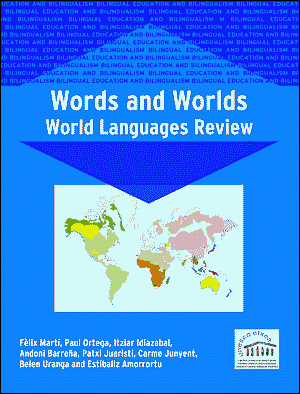
研究室で積ん読状態になっていた言語多様性 (language diversity) に関する本をパラパラとめくってみた.UNESCO ETXEA より2005年に出版された Words and Worlds: World Languages Review という題名の本だ.いつどのような経緯で入手したのかも覚えていないような多数の図書のうちの1冊である.
冒頭の1節を読んでいると,なかなか読ませる英文である.序章 (Prologue) の "The value of language diversity" と小見出しのついた1節の第1段落である (p. x) .以下に引用するので,ぜひ味わっていただければ.
Languages are humanity's most valuable cultural heritage. They are fundamental to understanding. Each language provides a system of concepts which helps us to interpret reality. The complexity of reality is easier to understand thanks to the diversity of languages. Progress in understanding is due, amongst other things, to the growing linguistic diversity that has characterised the human species. Languages are also fundamental in the generation and transmission of values. Each language expresses a differentiated ethical sensibility. Each language provides us with symbols and metaphors to deal with the mysterious and the sacred. Furthermore, languages are not closed or exclusive universes. All of them express the rationality of the human species as well as its common fears and hopes. Linguistic diversity is the most obvious manifestation of cultural diversity. In a world characterised by growing processes of globalisation, it seems necessary to assert the value of cultural diversity as a guarantee of more democratic and more creative coexistence. Cultural uniformity would mean a decline, to the extent that we would lose our ability to give specialised answers to specific challenges. The report "Our Creative Diversity", published by UNESCO in 1995, pointed out what orientations were necessary to preserve diversity without renouncing positive aspects of globalisation in the field of cultural and linguistic diversity. We often coincide with the criteria of the defenders of diversity of living species in the natural environment. In both cases it is said that there is a need to protect the heritage. The reason is not exclusively ethical. Both the defence of biological diversity and the defence of cultural and linguistic diversity are necessary conditions for the well-being of humans, for the balances that protect life and for the life quality we aspire to develop.
言語多様性の問題は生物多様性の問題と平行的に論じられることが多く,その旨がこの引用文でも明確に述べられている.ただし,前者は後者に比べて現代的課題として認知度が低い.
引用の最後にかけて,言語多様性を擁護する理由は倫理的なものだけではない,というくだりにとりわけ説得力を感じた.その点では生物多様性も言語多様性も同じであり,多様性の擁護は,人類の安寧,生活を守るバランス,生活の質の発展のための必要条件なのだという.多様性は "specialised answers to specific challenges" を提供してくれるという議論も同様に説得力がある.
以下,本書の目次を掲げておきたい.パラパラとしか読んでいないが,通読したい本が1冊増えた.
Prologue
Introduction
Chapter 1. Linguistic Communities
Chapter 2. The Linguistic Heritage
Chapter 3. The Official Status of Languages
Chapter 4. The Use of Languages in Public Administration
Chapter 5. Language and Writing
Chapter 6. Language and Education
Chapter 7. Languages and the Media
Chapter 8. Language and Religion
Chapter 9. Transmission and Intergenerational Use of Language
Chapter 10. Linguistic Attitudes
Chapter 11. The Threats to Languages
Chapter 12. The Future of Languages
・ Martí, Fèlix, Paul Ortega, Itziar Idiazabal, Andoni Barreña, Patxi Juaristi, Carme Junyent, Belen Uranga, and Estibaliz Amorrortu. Words and Worlds: World Languages Review. UNESCO ETXEA, 2005.
2024-02-23 Fri
■ #5415. 語彙記載項 (lexical entry) には何が記載されているか? [lexicon][lexicography][lexicology][semantics][dictionary][orthography][etymology]
私たちが普段使う英語辞書や日本語辞書などでは,見出し語のもとにどのような情報が記載されているだろうか.見出し語それ自体は,アルファベット順あるいは五十音順に並べられた上で,各語が正書法に則った文字列で掲げられているのが普通だろう.その後に発音(分節音や超分節音)の情報が記載されていることが多い.その後,品詞や各種の文法情報が示され,語義・定義が1つ以上列挙されるのが典型である.エントリーの末尾には,語法,派生語・関連語,語源,その他の注などが付されている辞書もあるだろう.個別の辞書 (dictionary) ごとに,詳細は異なるだろうが,おおよそこのようなレイアウトである.
では,私たち言語話者の頭の中にある辞書 (lexicon) は,どのように整理されており,各語の項目,すなわち語彙記載項 (lexical entry) にはどんな情報が「記載」されているのだろうか.これは,語彙論や意味論の理論的な問題である.
まず,語彙項目の並びがアルファベット順や五十音順ではないだろうことは直感される.また,文字を読み書きできない修学前の子供たちの頭の中の語彙記載項目には,正書法の情報は入っていないだろう.さらに(私などのように)特別に語源に関心のある話者でない限り,頭の中の語彙記載項に「語順欄」のような通時的なコーナーが設定されているとは考えにくい.
しかし,発音,品詞や各種の文法情報,語義については,紙の辞書 (dictionary) とは異なる形かとは予想されるが,何らかのフォーマットで頭の中の辞書にも「記載」されていると考えられる.では,具体的にどんなフォーマットなのだろうか.
これは語彙論や意味論の分野の理論的問題であり.これぞという定説や決定版が提案されているわけではない.直接頭の中を覗いてみるわけにはいかないからだ.ただし,大雑把な合意があることも確かだ.英語の単語で考える限り,例えば,Bauer (192--93) は,Lyons を参照し,他のいくつかの先行研究にも目配りしつつ,次の4項目を挙げている.
(i) stem(s)
(ii) inflectional class
(iii) syntactic properties
(iv) semantic specification(s)
(i) は stem(s) (語幹)とあるが,言わんとしていることは音韻論(分節音・超分節音)の情報のことである.(ii) は形態論的情報,(iii) は統語論的情報,(iv) は意味論的情報である.最後の項目は,多義の場合には「複数行」にわたるだろう.
理論言語学の見地からは,ここに正書法欄や語源欄の入る余地はないのだろう.認めざるを得ないが,文字と語源を愛でる歴史言語学者にとって,ちょっと寂しいところではある.
・ Bauer, Laurie. English Word-Formation. Cambridge: CUP, 1983.
・ Lyons, John. Semantics. Cambridge: CUP, 1977.
2024-02-22 Thu
■ #5414. dungeon の文化史と語源 [doublet][etymology][semantic_change][literature][french][latin][voicy][heldio]
NewsPicks 上で岡本広毅先生(立命館大学)が連載している「RPGで知る西洋の歴史」の最新記事が公開されています.「ダンジョンと〈ゴシック〉への入り口---商人トルネコが覗いた闇」です.

RPG 好きには「ダンジョン」 (dungeon) の響きはたまらないのではないでしょうか.その意味は「地下牢」?「洞窟」?「塔」? なぜ RPG にはダンジョンが付きものなの? ゴシック・ロマンスとの関係は? このような問いに答えてくれる文化史・文学史の記事です.
記事でも言及されていますが,英単語 dungeon は古フランス語 donjon を借用したものです(1300年頃).古フランス語での原義は「主君の塔」ほどでしたが,それが後に牢獄として利用された背景から,「牢獄」,とりわけ「地下牢」の意味を発達させました.さらには RPG 的な「未知なる危険の潜む空間」(上記記事を参照)という語義にまで発展してきました.文化史的に味わうべき意味変化 (semantic_change) の好例ですね.
さて,古フランス語 donjon は,さらに遡ると中世ラテン語の dominiōnem に行き着き,これは古典ラテン語の dominium に対応します.「君主の地位;統治権;領地」を意味しました.このラテン単語が直接英語に取り込まれたのが dominion 「領土;支配権」です.つまり,dungeon と dominion は2重語 (doublet) ということになります.
関連する話題は,以下の hellog や heldio のコンテンツで取り上げていますので,ぜひどうぞ.
・ hellog 「#3899. ラテン語 domus (家)の語根ネットワーク」 ([2019-12-30-1])
・ hellog 「#3898. danger, dangerous の意味変化」 ([2019-12-29-1])
・ heldio 「#118. danger のもともとの意味は「権力」」
・ heldio 「#273. 「支配権」 ― 今だから知っておきたい danger の原義」
・ hellog 「#1953. Stern による意味変化の7分類 (2)」 ([2014-09-01-1])
2024-02-21 Wed
■ #5413. ゲルマン祖語と古英語の1人称単数代名詞 [comparative_linguistics][personal_pronoun][pronoun][person][germanic][reconstruction][paradigm][oe][indo-european][rhotacism][analogy][sound_change]
Hogg and Fulk (202--203) を参照して,ゲルマン祖語 (Proto-Germanic) と古英語 (Old English) の1人称単数代名詞の格屈折を並べて示す.
| PGmc | OE | |
|---|---|---|
| Nom. | *ik | iċ |
| Acc. | *mek | mē |
| Gen. | *mīnō | mīn |
| Dat. | *miz | mē |
表の左側の PGmc の各屈折が,いかにして右側の OE の形態へ変化したか.ここにはきわめて複雑な類推 (analogy や音変化 (sound_change) やその他の過程が働いているという.Hogg and Fulk (203) の解説をそのまま引用しよう.
nom.sg.: *ik must have been the unstressed form, with analogical introduction of its vowel into the stressed form, with only ON ek showing retention of the original stressed vowel amongst the Gmc languages (cf. Lat egō/ǒ).
acc.sg.: *mek is the stressed form; all the other Gmc languages show generalization of unstressed *mik. The root is *me-, with the addition of *-k borrowed from the nom. The form mē could be due to loss of *-k when *mek was extended to unstressed positions, with lengthening of the final vowel when it was re-stressed . . . . More likely it represents replacement of the acc. by the dat. . . . as happened widely in Gmc and IE . . . .
gen.sg.: To the root *me- was added the adj. suffix *-īn- (cf. stǣnen 'made of stone' < *stain-īn-a-z . . .), presumably producing *mein- > *mīn- . . . . To this was added an adj. ending, perhaps nom.acc.pl. neut. *-ō, as assumed here.
dat.sg.: Unstressed *miz developed in the same way as *hiz . . . .
最後のところの PGmc *miz が,いかにして OE mē になったのかについて,Hogg and Fulk (198) を参照して補足しておこう.これはちょうど3人称男性単数主格の PGmc *hiz が OE *hē へ発達したのと平行的な発達だという.*hiz の z による下げの効果で *hez となり,次に語末子音が rhotacism を経て *her となった後に消失して *he となり,最後に強形として長母音化した hē に至ったとされる.
人称代名詞は高頻度の機能語として強形と弱形の交替が激しいともいわれるし,次々に新しい強形と弱形が生まれ続けるともされる.上記の解説を事情を概観するだけでも,比較言語学の難しさが分かる.関連して,以下の記事も参照.
・ 「#1198. ic → I」 ([2012-08-07-1])
・ 「#2076. us の発音の歴史」 ([2015-01-02-1])
・ 「#2077. you の発音の歴史」 ([2015-01-03-1])
・ 「#3713. 機能語の強音と弱音」 ([2019-06-27-1])
・ 「#3776. 機能語の強音と弱音 (2)」 ([2019-08-29-1])
・ Hogg, Richard M. and R. D. Fulk. A Grammar of Old English. Vol. 2. Morphology. Malden, MA: Wiley-Blackwell, 2011.
2024-02-20 Tue
■ #5412. 原初の言語は複雑だったのか,単純だったのか? [origin_of_language][language_change][evolution][history_of_linguistics][language_myth][sobokunagimon][simplification][homo_sapiens]
言語学史のハンドブックを読んでいる.Mufwene の言語の起源・進化に関する章では,これまでに提案されてきた様々な言語起源・進化論が紹介されており,一読の価値がある.
私もよく問われる素朴な疑問の1つに,原初の言語は複雑だったのか,あるいは単純だったのか,という言語の起源に関するものがある.一方,言語進化の観点からは,原初の段階から現代まで言語は単純化してきたのか,複雑化してきたのか,という関連する疑問が生じてくる.
真の答えは分からない.いずれの立場についても論者がいる.例えば,前者を採る Jespersen と,後者の論客 Bickerton は好対照をなす.Mufwene (31) の解説を引用しよう.
His [= Jespersen's] conclusion is that the initial language must have had forms that were more complex and non-analytic; modern languages reflect evolution toward perfection which must presumably be found in languages without inflections and tones. It is not clear what Jespersen's position on derivational morphology is. In any case, his views are at odds with Bickerton's . . . hypothesis that the protolanguage, which allegedly emerged by the late Homo erectus, was much simpler and had minimal syntax, if any. While Bickerton sees in pidgins fossils of that protolanguage and in creoles the earliest forms of complex grammar that could putatively evolve from them, Jespersen would perhaps see in them the ultimate stage of the evolution of language to date. Many of us today find it difficult to side with one or the other position.
両陣営ともに独自の前提に基づいており,その前提がそもそも正しいのかどうかを確認する手段がないので,議論は平行線をたどらざるを得ない.また,言語の複雑性と単純性とは何かという別の難題も立ちはだかる.最後の問題については「#1839. 言語の単純化とは何か」 ([2014-05-10-1]),「#4165. 言語の複雑さについて再考」 ([2020-09-21-1]) などを参照.
・ Mufwene, Salikoko S. "The Origins and the Evolution of Language." Chapter 1 of The Oxford Handbook of the History of Linguistics. Ed. Keith Allan. Oxford: OUP, 2013. 13--52.
2024-02-19 Mon
■ #5411. heldio で「文法化」を導入するシリーズをお届けしました [voicy][heldio][grammaticalisation][notice][hel_education][language_change][link]
毎朝6時に,本ブログの姉妹版ともいえる音声ブログ Voicy 「英語の語源が身につくラジオ (heldio)」を配信しています.2024年の heldio のテーマは言語変化 (language_change) です.大きなテーマなので取り上げていく話題も多岐にわたりますが,避けて通れないものの1つに文法化 (grammaticalisation) があります.本ブログでも「#417. 文法化とは?」 ([2010-06-18-1]) を始めとして,多くの記事で注目してきました.
先週,heldio にて5日連続で文法化の超入門となる話題をお届けしました.結果的に文法化の導入シリーズとなりました.こちらにリンクをまとめておきます.
・ 「#988. ぎゅうぎゅうの単語とすかすかの単語 --- 内容語と機能語」
・ 「#989. 内容語と機能語のそれぞれの特徴を比較する」
・ 「#990. 文法化とは何か?」
・ 「#991. while の文法化」
・ 「#992. while の文法化(続き)」
(以下,後記)
・ 「#1001. 英語の文法化について知りたいなら --- 保坂道雄(著)『文法化する英語』(開拓社,2014年)」
・ 「#1003. There is an apple on the table. --- 主語はどれ?」
(後記,ここまで)
5回の話しはスムーズにつながっているので,順に聴いていただくとよいと思います.手っ取り早く聴きたいという方は,中心回となる「#990. 文法化とは何か?」だけでもシリーズの大枠はつかめると思います.
もっと本格的に文法化を学びたいという方は,本ブログの grammaticalisation の各記事をご覧ください.特に重要な記事をいくつか挙げておきます.
・ 「#1972. Meillet の文法化」 ([2014-09-20-1])
・ 「#1974. 文法化研究の発展と拡大 (1)」 ([2014-09-22-1])
・ 「#1975. 文法化研究の発展と拡大 (2)」 ([2014-09-23-1])
・ 「#2575. 言語変化の一方向性」 ([2016-05-15-1])
・ 「#2576. 脱文法化と語彙化」 ([2016-05-16-1])
・ 「#3273. Lehman による文法化の尺度,6点」 ([2018-04-13-1])
・ 「#3272. 文法化の2つのメカニズム」 ([2018-04-12-1])
・ 「#3281. Hopper and Traugott による文法化の定義と本質」 ([2018-04-21-1])
・ 「#5124. Oxford Bibliographies による文法化研究の概要」 ([2023-05-08-1])
2024-02-18 Sun
■ #5410. A Dictionary of Japanese Loanwords --- 英語に入った日本語単語の辞書 [review][loan_word][japanese][lexicography][lexicology][false_friend][semantic_change][oed][dictionary]

眺めているだけでおもしろい,決して飽きない辞書の紹介です.Toshie M. Evans 氏により編集された,英語に入った日本語単語を収録する辞書 A Dictionary of Japanese Loanwords です.1997年に出版されています.この hellog でも「#142. 英語に借用された日本語の分布」 ([2009-09-16-1]) で参照した通りですが,820語の日本語由来の「英単語」がエントリーされています.単に見出し語が列挙されているだけでなく,多くの語には,1964年から1995年の間にアメリカで出版された資料から取られた例文が付されており,たいへん貴重です.
雰囲気を知っていただくために「火鉢」こと hibachi のエントリーを覗いてみましょう.
hibachi [hibɑːtʃi] n. pl. -chi or s, 1. a brazier used indoors for burning charcoal as a source of heat.
In an old-style shop, the selling activity took place in a front room on a tatami (straw mat) platform about one foot above the ground level. Customers removed their shoes, warmed themselves by sitting on the floor next to a hibachi (earthen container with glowing embers) and were served tea and sweets. (Places, Summer 1992, p. 81)
2. a portable brazier with a grill, used for outdoor cooking.
Double stamped steel hibachi, lightweight & portable. Goes with you to the backyard or even the beach for tasty cookouts? (Los Angeles Times, Jul. 7, 1985, Part I, p. 13, advertisement)
[< hibachi < hi fire + bachi < hachi pot] 1874: hebachi 1863 (OED)
語義1は日本の「火鉢」そのものなのですが,語義2の「バーベキューコンロ」にはたまげてしまいますね.この語とその意味変化については「#4386. 「火鉢」と hibachi, 「先輩」と senpai」 ([2021-04-30-1]) でも扱っているので,ご参照ください.
日本語から英語に入った借用語に関心のある方は,ぜひ以下の記事もどうぞ.
・ 「#126. 7言語による英語への影響の比較」 ([2009-08-31-1])
・ 「#45. 英語語彙にまつわる数値」 ([2009-06-12-1])
・ 「#2165. 20世紀後半の借用語ソース」 ([2015-04-01-1])
・ 「#3872. 英語に借用された主な日本語の借用年代」 ([2019-12-03-1])
・ 「#4140. 英語に借用された日本語の「いつ」と「どのくらい」」 ([2020-08-27-1])
・ 「#5055. 英語史における言語接触 --- 厳選8点(+3点)」 ([2023-02-28-1])
・ 「#5147. 「ゆる言語学ラジオ」出演第3回 --- 『ジーニアス英和辞典』第6版を読む回で触れられた諸々の話題」 ([2023-05-31-1])
・ Toshie M. Evans, ed. A Dictionary of Japanese Loanwords. Westport, Conn.: Greenwood, 1997.
2024-02-17 Sat
■ #5409. 最近 Mond で6件の質問に回答しました [mond][sobokunagimon][heldio][hel_education][notice][link]
ここ数日間で,知識共有サービス Mond に寄せられてきた英語史系の質問に6件ほど回答しました.こちらでもリンクを共有します(質問文の原文を短文に要約・編集してあります).新しい順に並べています.
今朝お答えした8歳の娘さんからの最新の質問は,とりわけ強力でしたね,パンチが効いています.これまで私が受けたことのなかった英語に関する素朴な疑問で,刺激的でした.ありがとうございます!
(1) boss ってなんで s がふたつなの?と8歳娘に質問されました.なんでですか?

(2) 英語がラテン語から動詞を借用するとき,完了分詞形に基づいた語形を採用するのはなぜなのでしょうか?
(3) Japan という単語の語源は?
(4) who, what, where, when などに対して,なぜ how だけが wh- でなく h- で始まるのでしょうか?
(5) 5文型の SVO などの V は「動詞」とされますが,「述語」が正しいのではないでしょうか?
(6) なぜ動作を表わすはずの動詞に「状態動詞」なるものがあるのでしょうか?
今回お答えした質問は,本ブログや Voicy 「英語の語源が身につくラジオ (heldio)」 で関連する話題を取り上げたり,詳しく解説してきたりしたものも多く,実際に回答のなかでいくつかリンクを張っていますので,合わせてご参照いただければと思います.
2024-02-16 Fri
■ #5408. 3人称代名詞はゲルマン祖語の共通基語に遡れない [indo-european][comparative_linguistics][personal_pronoun][pronoun][person][germanic][german][reconstruction]
英語の3人称代名詞 he, she, it, they (各々は主格の形)の屈折体系は現代でも複雑なほうだが,歴史的にも相当にかき混ぜられてきた経緯がある.対応する古英語の主格形を挙げれば,それぞれ hē, hēo, hit, hīe となるが,見た目だけでも現代との差が大きいことが分かる (cf. 「#155. 古英語の人称代名詞の屈折」 ([2009-09-29-1])).
ゲルマン諸語の人称代名詞体系を比べると,全体として類似しているとはいえ,とりわけ3人称の個々の格形については,必ずしも同一の語源に遡るわけではない.ましてや印欧祖語まで遡らせることもできない.つまり,1つの共通基語を再建することができないということになる.3人称代名詞は,この点で1,2人称代名詞や,指示詞,疑問詞などとは事情が異なる.Lass (139) より関連する説明を引用しよう.
Proto-Germanic did not inherit a fully coherent pronoun or determiner system; nothing quite like this reconstructs even for Proto-IE. Rather the collections labelled 'pronouns' or 'articles' or 'demonstratives' in the handbooks represent dialect-specific selections out of a mass of inherited forms and systems. There are clear IE first-, second-person pronoun systems: we can easily identify a first-person nom sg root */H1egh-/ (l eg-o, Go ik, OE ic 'I') and a second-person root in */t-/ (L tu, OCS ty, OE þū). There is also an interrogative in */kw-/ (L qu-is, OE hw-ā 'who?') and a deictic in */to-/ (Go to 'def art, masc nom sg', OE þæ-s 'def art m/n gen sg'). There is no reconstructable third-person pronoun, however. The personal pronouns may be heterogeneous even across Germanic: Go is, OE hē 'he' are not cognate. But overall the main systems are related, at least in outline.
これは何を意味するのだろうか? 3人称代名詞が他よりも後発であることを示唆するのだろうか? 冒頭に述べたように,英語史では歴史時代に限っても同語類は大きくかき混ぜられてきたという経緯がある.ということは,言語間・方言間の借用や体系内組み替えが頻繁な語類であるということなのだろうか?
・ Lass, Roger. Old English: A Historical Linguistic Companion. Cambridge: CUP, 1994.
2024-02-15 Thu
■ #5407. 言語学史は古代ギリシアから始まる? [greek][history_of_linguistics]
Robins による言語学史の入門書は,予想される通り古代ギリシアの伝統から始まる.西洋人の著わした言語学史として標準的な始め方であり,ことさらに「言い訳」する必要もないかと思われるのだが,Robins は言い訳をする.古代ギリシアの偉業を,念のために振り返っているのだろう.Robins (12) の1節を読んでみる.
For the reasons given in the preceding chapter, it is sensible to begin the history of linguistic studies with the achievements of the ancient Greeks. This has to do, primarily, not with the merits of their work, which are very considerable, nor with the deficiencies in it that latter-day scholars looking back from the privileged standpoint of those at the far end of a long tradition, may justifiably point out. It is simply that the Greek thinkers on language, and on the problems raised by linguistic investigations, initiated in Europe the studies that we can call linguistic science in its widest sense, and that this science was a continuing focus of interest from Ancient Greece until the present day in an unbroken succession of scholarship, wherein each worker was conscious of and in some way reacting to the work of his predecessors.
古代ギリシアの言語論が,現代にまで続く西洋の言語論の源泉になっているということを確認しているものと読むことができる.なるほど,かつての言語論に非はあったとしても,現代までに訂正や補足を繰り返して,連続してきたことが重要だという主張なのだろう.これは西洋の言語学のみならず西洋の哲学の伝統などでもそうだが,認めてよいと思う.続いてきたものは強い.
・ Robins, R. H. A Short History of Linguistics. 4th ed. Longman: London and New York, 1997.
2024-02-14 Wed
■ #5406. ダーウィンによる人類の進化,言語の進化,精神の進化 [homo_sapiens][origin_of_language][evolution][history_of_linguistics][darwin][ai]
Charles Darwin (1809--82) は,言語の進化は人類の進化そのものと平行的なところがあると考えており,また精神の進化とも関係しているとも述べている.特に後者に関して進化を考える上で言語と精神とを結びつけてみた論者は,Darwin が最初に近かったようだ.Mufwene (23) より解説を引用する.
Charles Darwin commented in The Descent of Man (1871) that the evolution of language was in several ways reminiscent of that of mankind itself. He hypotheisized that it had emerged gradually, had not been given by God or invented by design by humans, and could also be explained by natural selection. He was among the first to correlate the evolution of language with that of the human mind . . . , thus accounting for why parrots cannot produce original spoken messages intentionally, although they can imitate human speech fairly accurately. Showing what an important driver role the human mind has played in the evolution of language, he argued that it was for the same reason that other primates do not use their buccopharyngeal structure to speak.
これは生成AIが産出する言語が真の言語なのかという点にも関わってくる点で,古くて新しい論点かもしれない.
さらに,上の解説に続けて Mufwene (23) は,言語能力の発現と諸言語の発生は独立しているか否かという,もう1つの重要な論点を指摘している.
We now know that Charles Darwin was only partly right. The other primates' buccopharyngeal structure is not shaped in exactly the same way as that of humans, although, based on the parrot's phonetic accomplishments, we must wonder how critical this particular structure was for the emergence of language (not speech!) in the first place. After all, humans who cannot speak produce signed language, which is just as adequate for communication. This argument may be claimed to support the position that the emergence of the capacity for language must be distinguished from the emergence of languages. However, one must also wonder whether the two questions can be considered independently of each other . . . .
この論点も現代の視点からみると余計におもしろい.生成AIは,人間が発した多くの既存の言語データをエネルギーとして,言語能力らしきもの(正確にいえば言語産出の手法)を獲得したからである.
この時代に,Darwin を読んでみるのも有意義かもしれない.
・ Mufwene, Salikoko S. "The Origins and the Evolution of Language." Chapter 1 of The Oxford Handbook of the History of Linguistics. Ed. Keith Allan. Oxford: OUP, 2013. 13--52.
2024-02-13 Tue
■ #5405. 言語多起源説を唱えた Maupertuis [homo_sapiens][origin_of_language][evolution][history_of_linguistics][language_myth][tower_of_babel]
連日 Mufwene を参照しつつ言語の起源をめぐる学説史を振り返っている.今回は,言語多起源説を唱えたフランスの哲学者・数学者の Pierre Louis Moreau de Maupertuis (1698--1759) を取り上げたい.Maupertuis は言語の多様性を説明するのに「バベルの塔」 (tower_of_babel) という神の力に頼ることをせず,そもそも言語発生の原初から多様な言語があったと,つまり言語の起源は複数あったと論じた.言語単一起源説 (monogenesis) に対する言語多起源説 (polygenesis) の提唱である.Mufwene (22--23) より関連する解説部分を引用する.
Another important philosopher of the eighteenth century was Pierre Louis Moreau de Maupertuis, author of Réflexions sur l'origine des langues et la vie des mots (1748). Among other things, he sought to answer the question of whether modern languages can ultimately be traced back to one single common ancestor or whether current diversity reflects polygenesis, with different populations developing their own languages. Associating monogenesis with the Tower of Babel myth, which needs a deus ex machina, God, to account for the diversification of languages, he rejected it in favour of polygenesis. Note, however, that his position needs Cartesianism, which assumes that all humans are endowed with the same mental capacity and suggests that our hominin ancestors could have invented similar communicative technologies at the same or similar stages of our phylogenetic evolution. This position makes it natural to project the existence of language as the common essence of languages beyond their differences.
人類の言語能力それ自体は世界のどこででもほぼ同時期に開花したが,そこから生み出されてきた個々の言語は互いに異なっており,全体として言語の多様性が現出した.これが Maupertuis の捉え方だろう.
単一起源説と多起源説については「#2841. 人類の起源と言語の起源の関係」 ([2017-02-05-1]) の記事も参照.
・ Mufwene, Salikoko S. "The Origins and the Evolution of Language." Chapter 1 of The Oxford Handbook of the History of Linguistics. Ed. Keith Allan. Oxford: OUP, 2013. 13--52.
2024-02-12 Mon
■ #5404. 言語は名詞から始まったのか,動詞から始まったのか? [homo_sapiens][origin_of_language][evolution][history_of_linguistics][grammaticalisation][noun][verb][category][name_project][onomastics][naming]
標題は解決しようのない疑問ではあるが,言語学史 (history_of_linguistics) においては言語の起源 (origin_of_language) をめぐる議論のなかで時々言及されてきた問いである.
Mufwene (22) を参照して,2人の論者とその見解を紹介したい.ドイツの哲学者 Johann Gottfried von Herder (1744--1803) とアメリカの言語学者 William Dwight Whitney (1827--94) である.
Herder also speculated that language started with the practice of naming. He claimed that predicates, which denote activities and conditions, were the first names; nouns were derived from them . . . . He thus partly anticipated Heine and Kuteva (2007), who argue that grammar emerged gradually, through the grammaticization of nouns and verbs into grammatical markers, including complementizers, which make it possible to form complex sentences. An issue arising from Herder's position is whether nouns and verbs could not have emerged concurrently. . . .
On the other hand, as hypothesized by William Dwight Whitney . . . , the original naming practice need not have entailed the distinction between nouns and verbs and the capacity to predicate. At the same time, naming may have amounted to pointing with (pre-)linguistic signs; predication may have started only after hominins were capable of describing states of affairs compositionally, combining word-size units in this case, rather than holophrastically.
Herder は言語は名付け (naming) の実践から始まったと考えた.ところが,その名付けの結果としての「名前」が最初は名詞ではなく述語動詞だったという.この辺りは意外な発想で興味深い.Herder は,名詞は後に動詞から派生したものであると考えた.これは現代の文法化 (grammaticalisation) の理論でいうところの文法範疇の創発という考え方に近いかもしれない.
一方,Whitney は,言語は動詞と名詞の区別のない段階で一語表現 (holophrasis) に発したのであり,あくまで後になってからそれらの文法範疇が発達したと考えた.
言語起源論と文法化理論はこのような論点において関係づけられるのかと感心した次第.
・ Mufwene, Salikoko S. "The Origins and the Evolution of Language." Chapter 1 of The Oxford Handbook of the History of Linguistics. Ed. Keith Allan. Oxford: OUP, 2013. 13--52.
2024-02-11 Sun
■ #5403. 感情的叫びから理性的単調へ --- ルソーの言語起源・発達論 [roussseau][anthropology][homo_sapiens][origin_of_language][evolution][language_myth][history_of_linguistics]
フランスの思想家ルソー (Jean Jacques Rousseau [1712--78]) は,人類言語の起源は感情的叫びにあると考えた.その後,言語は人類の精神,社会,環境の変化とともに,より理性的なものへと発展してきたという.これは言語の起源と発達に関する古典的かつ代表的な仮説の1つといってよいだろう.
ルソーは言語起源・発達について,上記の基本的な考え方に基づき,より具体的な一風変わった諸点にも言及している.Mufwene (19--20) によるルソー解説を引用したい.
. . . Rousseau interpreted evolution as progress towards a more explicit architecture meant to express reason more than emotion. According to him,
Anyone who studies the history and progress of tongues will see that the more words become monotonous, the more consonants multiply; that, as accents fall into disuse and quantities are neutralized, they are replaced by grammatical combinations and new articulations. [...] To the degree that needs multiply [...] language changes its character. It becomes more regular and less passionate. It substitutes ideas for feelings. It no longer speaks to the heart but to reason. (Moran and Gode 1966: 16)
Thus, Rousseau interpreted the evolution of language as gradual, reflecting changes in the Homo genus's mental, social, and environmental structures. He also suggests that consonants emerged after vowels (at least some of them), out of necessity to keep 'words' less 'monotonous.' Consonants would putatively have made it easier to identify transitions from one syllable to another. He speaks of 'break[ing] down the speaking voice into a given number of elementary parts, either vocal or articulate [i.e. consonantal?], with which one can form all the words and syllables imaginable' . . . .
言語が,人間の理性の発達とともに "monotonous" となってきて,"consonants" が増えてきたという発想が興味深い.この発想の背景には,声調を利用する「感情的な」諸言語が非西洋地域で話されていることをルソーが知っていたという事実がある.ルソーも時代の偏見から自由ではなかったことがわかる.
・ Mufwene, Salikoko S. "The Origins and the Evolution of Language." Chapter 1 of The Oxford Handbook of the History of Linguistics. Ed. Keith Allan. Oxford: OUP, 2013. 13--52.
2024-02-10 Sat
■ #5402. 2023年度に提出された卒論論文と修士論文の題目 [hel_education][sotsuron][shuron][khelf][seminar][link]
今年度,慶應義塾大学文学部英米文学専攻の堀田ゼミより14本の卒業論文と1本の修士論文が提出されました.以下,各々の題目を一覧します.私の英語史のゼミでどんなことが研究テーマとなるのかが伝わると思います.
[ 卒業論文 ]
・ Changes in the Frequency of Inanimate S-Genitive Case Use in British Popular and Quality Papers
・ The Characteristics and Development of Suffix -some in the History of English
・ The Origin and Development of the Construction It is Adj of NP to VP
・ The Difference between To-infinitive and Bare Infinitive in a Subjective Complement
・ A Study on the Singular and Plural Concord with the Collective Noun "Government"
・ An HTOED-Based Study on Semantic Change of Words Meaning "Delicious"
・ Contemporary Usage of 'unto' with Semantic Extension from the Bible
・ The Usage of Metonymies Shared among ENL Areas: The Case of Governmental Facilities
・ Stylistic Differences and Literary Commonalities among Two Works of George Orwell
・ Changes in the Social Demand and Frequency of the Woman's Honorific Title Ms
・ Decoding the N-word: A 20-Year Analysis of Language Evolution in Grammy Nominated Rap (2004--2024)
・ Political Correctness of the Infectious Disease Names: Hansen's disease, AIDS, and Mpox
・ Class Society and Language in Britain: Focusing on the Linguistic Characteristics of the Beatles
・ Changes and Trends of English Use in the Indian Movies: New Middle Class as the Audience
[ 修士論文 ]
・ Tautologies in the History of English: Their Usage and Conventionality
今年度のゼミでも英語史・英語学に関する多様なテーマで研究がなされました.形態論,統語論,意味論,語用論,語法研究,文体論,社会言語学など,関心が多岐にわたる点が,本ゼミの特徴です.ただし今回は音声学・音韻論に注目した研究がありませんでした(私としては少々寂しい).調査方法としてはコーパスを用いた実証的な研究が基本となってきています.来年度の卒論・修論にもテーマの幅広さを期待しています!
過年度のゼミ卒業論文の題目についてはこちらの記事セットあるいは sotsuron をどうぞ.英語史分野のテーマ探しのヒントとなるかと思います.khelf HP より「研究テーマ紹介」,あるいはゼミ紹介 HP より「ゼミ生の卒論テーマ」も役立つと思います.
2024-02-09 Fri
■ #5401. 文法上の性について60分間の対談精読実況生中継をお届けしました [bchel][gender][oe][noun][category][voicy][heldio][notice][hel_education]
去る2月6日(火)午後4時半より Voicy heldio にて「#983. B&Cの第42節「文法性」の対談精読実況生中継 with 金田拓さんと小河舜さん」を生放送でお届けしました.Baugh and Cable による英語史の古典的名著 A History of the English Language (第6版)を原書で精読するシリーズの一環です.今回は特別ゲストとして金田拓さん(帝京科学大学)と小河舜さん(フェリス女学院大学ほか)をお招きして,対談精読実況生中継としてお届けしました.上記は,昨日の通常配信でアーカイヴとして公開したものです.60分間の長丁場ですが,ぜひお時間のあるときにお聴きください.
2月5日(月)には,この hellog 上でも予告編となる記事「#5397. 文法上の「性」を考える --- Baugh and Cable の英語史より」 ([2024-02-05-1]) を公開しました.そちらの記事では今回注目した第42節 "Grammatical Gender" の原文を掲載していますので,それを眺めながらお聴きいただければと思います.そこからは,英語史における性 (gender) の話題に注目した重要な記事へのリンクも張っています.
早々に配信を聴いてくださったコアリスナーの umisio さんが,まとめノートを作ってこちらのページで公開されています.ぜひ予習・復習のおともにご参照ください.
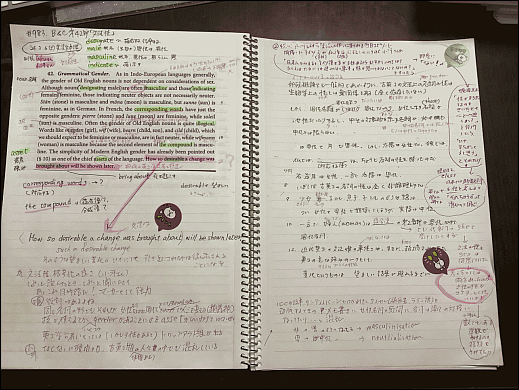
heldio で B&C の英語史を精読するシリーズのバックナンバー一覧は「#5291. heldio の「英語史の古典的名著 Baugh and Cable を読む」シリーズが順調に進んでいます」 ([2023-10-22-1]) でまとめています.全264節ある本の第42節にようやくたどり着いたところですので,まだまだ序盤戦です.皆さんには後追いでかまいませんので,このオンライン精読シリーズにご参加いただければ.まずは以下のテキストを入手してください!
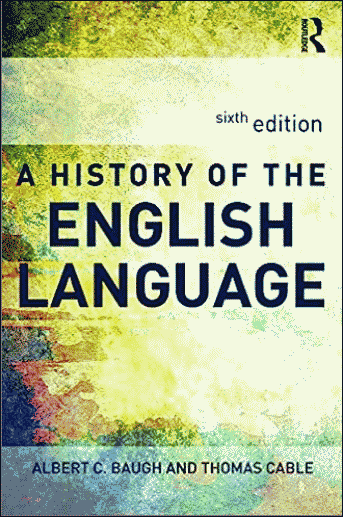
・ Baugh, Albert C. and Thomas Cable. A History of the English Language. 6th ed. London: Routledge, 2013.
2024-02-08 Thu
■ #5400. ルクレティウスの集団的言語起源論 [origin_of_language]
紀元前1世紀のローマの詩人・哲学者 Titus Lucretius Titus (B.C 96?--55?) が興味深い言語起源論を提起している.現代の主流の仮説となっている言語単一起源説 (monogenesis) の1変種ともみなせるが,一方で重要な疑念を呈しているともとらえられる.1個人から言語が発生したとしてもコミュニケーションツールとしての有用性はない以上,言語は集団的に発生したと考えざるを得ない,という議論である.Mufwene (17--18) が,この見解を引用し,紹介している.
Writing in the first century BC, the Roman poet and philosopher Titus Lucretius Carus questioned one particular brand of monogenesis that is not necessarily Adamic:
[...] To think that one individual then distributed names to things and that humans learned the first words from him is absurd. For why would he be able to mark everything with utterances and emit different sounds of the tongue, and at the same time others not being capable of having done it? Besides, if others too had not used their voices with one another, from where was the notion of utility implanted, and from where was this power first granted to him, to know what he wanted to do and conceive of it in his mind? Similarly, one person could not have prevailed and forced so many to want to learn the names of things so thoroughly [...] (Lucretius Carus 2003 [?54 BC]: ll. 1041--51).
Lucretius thereby suggests that language emerged and evolved from the collective communicative acts of individuals interacting with each other. We may, in modern terms, think of different interactants innovating on different occasions and the successful innovations being copied by others. This is the position articulated by Michel Bréal in the late nineteenth century . . . , in contrast with the vast majority of scholars who have simply ignored the question.
ルクレティウスの疑義はまっとうのように思われる.あるいは,言語能力の発現と言語使用の開始を分けて考えた方がよいのだろうか.「言語の起源」や「言語の発生」が意味するところに応じて答えも変わってくる可能性がある.
・ Mufwene, Salikoko S. "The Origins and the Evolution of Language." Chapter 1 of The Oxford Handbook of the History of Linguistics. Ed. Keith Allan. Oxford: OUP, 2013. 13--52.
2024-02-07 Wed
■ #5399. 言語の多様性に関する聖書の記述は「バベルの塔」だけでなく「セム,ハム,ヤペテ」も忘れずに [bible][origin_of_language][language_myth][tower_of_babel][popular_passage][race][ethnic_group]
昨日の記事「#5398. ヘロドトスにみる言語の創成」 ([2024-02-06-1]) で,過去記事「#2946. 聖書にみる言語の創成と拡散」 ([2017-05-21-1]) に触れた.聖書にみられる言語の拡散や多様性に関する話としては,創世記第11章の「バベルの塔」 (tower_of_babel) の件がとりわけ有名だが,実はそれ以前の第10章第5節にノアの3人の子供であるセム,ハム,ヤペテの子孫が,それぞれの土地でそれぞれの言語を話していたという記述がある.King James Version より引用しよう.
By these were the isles of the Gentiles divided in their lands; every one after his tongue, after their families, in their nations.
この点については,Mufwene (16) が他の研究者を参照しつつ,脚注で指摘している.
Hombert and Lenclud (in press) identify another, less well-recalled account also from the book of Genesis. God reportedly told Noah and his children to be fecund and populate the world. Subsequently, the descendants of Sem, Cham, and Japhet spread all over the world and built nations where they spoke different languages. Here one also finds an early, if not the earliest, version of the assumption that every nation must be identified through the language spoken by its population.
言語と国家・民族・人種の関係という抜き差しならない問題が,すでに創世記に埋め込まれているのである.関連して次の記事群も参照.
・ 「#1871. 言語と人種」 ([2014-06-11-1])
・ 「#3599. 言語と人種 (2)」 ([2019-03-05-1])
・ 「#3706. 民族と人種」 ([2019-06-20-1])
・ 「#3810. 社会的な構築物としての「人種」」 ([2019-10-02-1])
・ 「#4846. 遺伝と言語の関係」 ([2022-08-03-1])
・ 「#5368. ethnonym (民族名)」 ([2024-01-07-1])
・ Mufwene, Salikoko S. "The Origins and the Evolution of Language." Chapter 1 of The Oxford Handbook of the History of Linguistics. Ed. Keith Allan. Oxford: OUP, 2013. 13--52.
2024-02-06 Tue
■ #5398. ヘロドトスにみる言語の創成 [origin_of_language][greek][phrygian][herodotus][history_of_linguistics][popular_passage][bible][language_myth][heldio][voicy]
「歴史の父」こと古代ギリシア歴史家ヘロドトス (Herodotus, B.C. 485?--425?) の手になる著『歴史』に,言語創成 (origin_of_language) に関する有名な話が記されている.古代エジプト第26王朝の初代の王であるプサンメティコス1世 (Psammetichus [Psamtik], B.C. 664--610) が,最も古い言語は何かを明らかにするために,新生児を用いてある実験をした,という言い伝えである.これについて,Perseus Digital Library のテキストコレクションより,Herodotus, The Histories (ed. A. D. Godley) の第2巻の第2章(英訳版)を引用する.
Now before Psammetichus became king of Egypt, the Egyptians believed that they were the oldest people on earth. But ever since Psammetichus became king and wished to find out which people were the oldest, they have believed that the Phrygians were older than they, and they than everybody else. Psammetichus, when he was in no way able to learn by inquiry which people had first come into being, devised a plan by which he took two newborn children of the common people and gave them to a shepherd to bring up among his flocks. He gave instructions that no one was to speak a word in their hearing; they were to stay by themselves in a lonely hut, and in due time the shepherd was to bring goats and give the children their milk and do everything else necessary. Psammetichus did this, and gave these instructions, because he wanted to hear what speech would first come from the children, when they were past the age of indistinct babbling. And he had his wish; for one day, when the shepherd had done as he was told for two years, both children ran to him stretching out their hands and calling "Bekos!" as he opened the door and entered. When he first heard this, he kept quiet about it; but when, coming often and paying careful attention, he kept hearing this same word, he told his master at last and brought the children into the king's presence as required. Psammetichus then heard them himself, and asked to what language the word "Bekos" belonged; he found it to be a Phrygian word, signifying bread. Reasoning from this, the Egyptians acknowledged that the Phrygians were older than they. This is the story which I heard from the priests of Hephaestus' temple at Memphis; the Greeks say among many foolish things that Psammetichus had the children reared by women whose tongues he had cut out.
現代の観点からは1つの逸話にすぎないように思われるかもしれないが,言語の創成についてはいまだに分からないことが多いという事実は踏まえておく必要がある.もっと有名なもう1つの言い伝えは,言わずとしれた聖書の記述である.これについては「#2946. 聖書にみる言語の創成と拡散」 ([2017-05-21-1]) を参照.
関連して「#4612. 言語の起源と発達を巡る諸問題」 ([2021-12-12-1]),「#4614. 言語の起源と発達を巡る諸説の昔と今」 ([2021-12-14-1]) も挙げておきたい.
ちなみに,昨日の Voicy heldio にて関連する話題を取り上げた.「#980. 赤ちゃんは無言語状態で育てられても言語を習得できるのか? --- 目白大学の学生から寄せてもらった素朴な疑問」をお聴きいただければ.
2024-02-05 Mon
■ #5397. 文法上の「性」を考える --- Baugh and Cable の英語史より [bchel][gender][oe][noun][category][voicy][heldio][notice][hel_education][link]
昨年7月より週1,2回のペースで Baugh and Cable の英語史の古典的名著 A History of the English Language (第6版)を原書で精読する Voicy 「英語の語源が身につくラジオ」 (heldio) でのシリーズ企画を進めています.1回200円の有料配信となっていますが第1チャプターに関してはいつでも試聴可です.またときどきテキストも公開しながら無料の一般配信も行なっています.これまでのバックナンバーは「#5291. heldio の「英語史の古典的名著 Baugh and Cable を読む」シリーズが順調に進んでいます」 ([2023-10-22-1]) にまとめてありますので,ご確認ください.

今までに41節をカバーしてきました.目下,古英語を扱う第3章に入っています.次回取り上げる第42節 "Grammatical Gender" は,古英語の名詞に確認される文法上の「性」,すなわち文法性 (gender) に着目します.以下に同節のテキストを掲載しておきます(できれば本書を入手していただくのがベストです).
42. Grammatical Gender. As in Indo-European languages generally, the gender of Old English nouns is not dependent on considerations of sex. Although nouns designating males are often masculine, and those indicating females feminine, those indicating neuter objects are not necessarily neuter. Stān (stone) is masculine, and mōna (moon) is masculine, but sunne (sun) is feminine, as in German. In French, the corresponding words have just the opposite genders: pierre (stone) and lune (moon) are feminine, while soleil (sun) is masculine. Often the gender of Old English nouns is quite illogical. Words like mægden (girl), wīf (wife), bearn (child, son), and cild (child), which we should expect to be feminine or masculine, are in fact neuter, while wīfmann (woman) is masculine because the second element of the compound is masculine. The simplicity of Modern English gender has already been pointed out as one of the chief assets of the language. How so desirable a change was brought about will be shown later.
文法性に関する話題は hellog でも gender のタグを付した多くの記事で取り上げてきました.そのなかから特に重要な記事へのリンクを以下に張っておきます.
・ 「#25. 古英語の名詞屈折(1)」 ([2009-05-23-1])
・ 「#26. 古英語の名詞屈折(2)」 ([2009-05-24-1])
・ 「#28. 古英語に自然性はなかったか?」 ([2009-05-26-1])
・ 「#487. 主な印欧諸語の文法性」 ([2010-08-27-1])
・ 「#1135. 印欧祖語の文法性の起源」 ([2012-06-05-1])
・ 「#2853. 言語における性と人間の分類フェチ」 ([2017-02-17-1])
・ 「#3293. 古英語の名詞の性の例」 ([2018-05-03-1])
・ 「#4039. 言語における性とはフェチである」 ([2020-05-18-1])
・ 「#4040. 「言語に反映されている人間の分類フェチ」の記事セット」 ([2020-05-19-1])
・ 「#4182. 「言語と性」のテーマの広さ」 ([2020-10-08-1])
・ Baugh, Albert C. and Thomas Cable. A History of the English Language. 6th ed. London: Routledge, 2013.
2024-02-04 Sun
■ #5396. フランス語とラテン語からの大量の語彙借用は英語の何をどう変えたか? [lexicology][french][latin][loan_word][word_formation][lexical_stratification][contact][semantic_change][derivation]
英語語彙史においてフランス語やラテン語の影響が甚大であることは,折に触れて紹介してきた.何といっても借用された単語の数が万単位に及び,大きい.しかし,数や量だけの影響にとどまらない.大規模借用の結果として,英語語彙の質も,主に中英語期以降に,著しく変化した.その質的変化について,Durkin (224) が重要な3点を指摘している.
・ The derivational morphology of English was (eventually) completely transformed by the accommodation of whole word families of related words from French and Latin, and by the analogous expansion of other word families within English exploiting the same French and Latin derivational affixes (especially suffixes).
・ Not only was a good deal of native vocabulary simply lost, but many other existing words showed meaning changes (especially narrowing) as semantic fields were reshaped following the adoption of new words from French and Latin.
・ The massive borrowing of less basic vocabulary, especially in a whole range of technical areas, led to extensive and enduring layering or stratification in the lexis of English, and also to a high degree of dissociation in many semantic fields (e.g. the usual adjective corresponding in meaning to hand is the etymologically unrelated manual)
1点目は,単語の家族 (word family) や語形成 (word_formation) そのものが,本来の英語的なものからフランス・ラテン語的なものに大幅に入れ替わったことに触れている.2点目は,本来語が死語になったり,意味変化 (semantic_change) を経たりしたものが多い事実を指摘している.3点目は,比較的程度の高い語彙の層が新しく付け加わり,語彙階層 (lexical_stratification) が生じたことに関係する.
単純化したキーワードで示せば,(1) 語形成の変質,(2) 意味変化,(3) 語彙階層の発生,といったところだろうか.これらがフランス語・ラテン語からの大量借用の英語語彙史上の質的意義である.
・ Durkin, Philip. Borrowed Words: A History of Loanwords in English. Oxford: OUP, 2014.
2024-02-03 Sat
■ #5395. 2月24日(土),朝カルのシリーズ講座「文字と綴字の英語史」の第4回「近代英語の綴字 --- 標準化を目指して」 [asacul][notice][writing][spelling][orthography][mode][standardisation][etymological_respelling][link][voicy][heldio][chancery_standard][spelling_reform]
3週間後の2月24日(土)の 15:30--18:45 に,朝日カルチャーセンター新宿教室にてシリーズ講座「文字と綴字の英語史」の第4回となる「近代英語の綴字 --- 標準化を目指して」が開講されます.
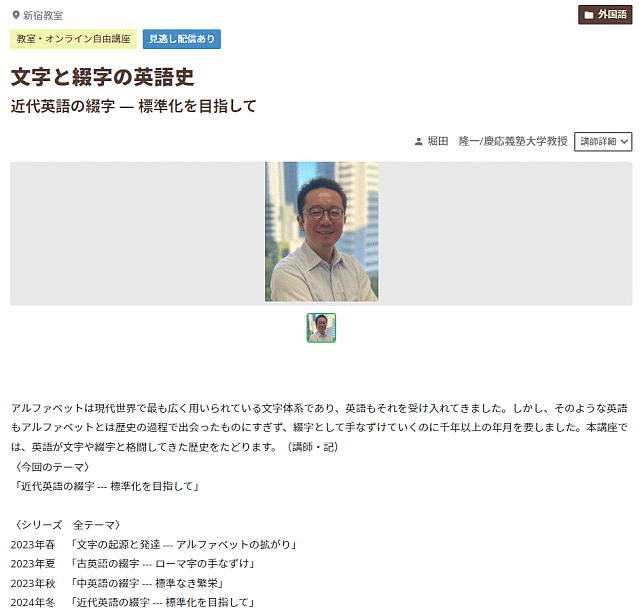
今回の講座は,全4回のシリーズの第4回となります.シリーズのラインナップは以下の通りです.
・ 第1回 文字の起源と発達 --- アルファベットの拡がり(春・4月29日)
・ 第2回 古英語の綴字 --- ローマ字の手なずけ(夏・7月29日)
・ 第3回 中英語の綴字 --- 標準なき繁栄(秋・10月7日)
・ 第4回 近代英語の綴字 --- 標準化を目指して(冬・2月24日)
今度の第4回については,先日 Voicy heldio にて「#971. 近代英語の綴字 --- 2月24日(土)の朝カルのシリーズ講座第4回に向けて」として概要を紹介していますので,お聴きいただければ幸いです.
これまでの3回の講座では,英語綴字の標準化の前史を眺めてきました.今回はいよいよ近現代における標準化の実態に迫ります.まず,15世紀の Chancery Standard に始まり,16世紀末から17世紀にかけての Shakespeare,『欽定訳聖書』,初期の英語辞書の時代を経て,18--19世紀の辞書完成に至るまでの時期に注目し,英単語の綴字の揺れと変遷を追います.その後,アメリカ英語の綴字,そして現代の綴字改革の動きまでをフォローして,現代英語の綴字の課題について論じる予定です.各時代の英単語の綴字の具体例を示しながら解説しますので,迷子になることはありません.
本講座にご関心のある方は,ぜひこちらのページよりお申し込みください.講座当日は,対面のほかオンラインでの参加も可能です.また,参加登録されますと,開講後1週間「見逃し配信」を視聴できます.ご都合のよい方法でご参加いただければと思います.シリーズ講座ではありますが,各回の内容は独立していますので,今回のみの単発のご参加でもまったく問題ありません.なお,講座で用いる資料は,当日,参加者の皆様に電子的に配布される予定です.
本シリーズと関連して,以下の hellog 記事,および Voicy heldio 配信回もご参照ください.
[ 第1回 文字の起源と発達 --- アルファベットの拡がり ]
・ heldio 「#668. 朝カル講座の新シリーズ「文字と綴字の英語史」が4月29日より始まります」(2023年3月30日)
・ hellog 「#5088. 朝カル講座の新シリーズ「文字と綴字の英語史」が4月29日より始まります」 ([2023-04-02-1])
・ hellog 「#5119. 朝カル講座の新シリーズ「文字と綴字の英語史」の第1回を終えました」 ([2023-05-03-1])
[ 第2回 古英語の綴字 --- ローマ字の手なずけ ]
・ hellog 「#5194. 7月29日(土),朝カルのシリーズ講座「文字と綴字の英語史」の第2回「古英語の綴字 --- ローマ字の手なずけ」」 ([2023-07-17-1])
・ heldio 「#778. 古英語の文字 --- 7月29日(土)の朝カルのシリーズ講座第2回に向けて」(2023年7月18日)
・ hellog 「#5207. 朝カルのシリーズ講座「文字と綴字の英語史」の第2回「古英語の綴字 --- ローマ字の手なずけ」を終えました」 ([2023-07-30-1])
[ 第3回 中英語の綴字 --- 標準なき繁栄 ]
・ hellog 「#5263. 10月7日(土),朝カルのシリーズ講座「文字と綴字の英語史」の第3回「中英語の綴字 --- 標準なき繁栄」」 ([2023-09-24-1])
・ heldio 「#848. 中英語の標準なき綴字 --- 10月7日(土)の朝カルのシリーズ講座第3回に向けて」(2023年9月26日)
[ 第4回 近代英語の綴字 --- 標準化を目指して ]
・ heldio 「#971. 近代英語の綴字 --- 2月24日(土)の朝カルのシリーズ講座第4回に向けて」(2024年1月27日)
多くの方々のご参加をお待ちしております.
2024-02-02 Fri
■ #5394. 2月9日,ゆる学徒カフェにて,ゆる言語学ラジオ・水野太貴さんをゲストにお迎えして「いのほたチャンネル」の公開収録! [inohota][yurugengogakuradio][notice]
標題の通り,「いのほたチャンネル」(旧「井上逸兵・堀田隆一英語学言語学チャンネル」)初の公開収録のお知らせです.1週間後の2月9日(金)の夜7:00より,池袋のゆる学徒カフェのスタジオにて,「ゆる言語学ラジオ」の水野太貴さんをお招きして公開収録します.チケット予約の受付が始まっています.公開収録イベントに参加をご希望の方は,ぜひこちらよりどうぞ.
・ いのほた言語学チャンネル公開収録 with 水野太貴
・ 開場 --- 19:00
・ 開演 --- 19:30
・ 終了 --- 21:30
・ 閉店 --- 23:00
井上・堀田にとって,初めての公開収録(しかも「ゆる学徒カフェ」にて観客の方々にご同席いただきながら!)の初挑戦となります.ドキドキします.当日は水野さんに,言語学(を広めていくこと)への思いなどをたっぷり伺いたいと思っています.言語学・英語学・英語史のおもしろさを伝え,裾野を広げる活動を繰り広げる者として,たいへん楽しみにしています.
過去の「いのほたチャンネル」への水野さん出演回については,以下をご覧ください.
1. 「#120. ゆる言語学ラジオ・水野太貴さんにお越しいただきました!」
2. 「#122. ゆる言語学ラジオ・水野太貴さん登場!第2弾・語に始まって語に終わる」
3. 「#124. ゆる言語学ラジオ・水野太貴さん登場!第3弾・ゆる言語学ラジオはゆるくない!」
4. 「#126. ゆる言語学ラジオ・水野太貴さん登場!第4弾・水野さんから見たこのチャンネル?」
以上,イベントのお知らせでした.
2024-02-01 Thu
■ #5393. 2023年度,1年間の「英語史」の講義を終えて [hel_education]
一昨日の Voicy heldio にて「#974. 1年間の「英語史」の講義を終えて --- 2023年度版」と題して,慶應義塾大学文学部英米文学専攻で私が開講している「英語史」講義の履修者から回収した感想をいくつか紹介しました.毎年この時期に hellog や heldio にて報告する慣習ができ,恒例のイベントとなってきた感があります.今年度のものを含めこれまでの「英語史」講義への感想のリンクを以下にまとめておきます.
・ heldio 「#974. 1年間の「英語史」の講義を終えて --- 2023年度版」 (2024/01/30)
・ helwa (有料配信)「【英語史の輪 #87】1年間の「英語史」の講義を終えて(続編)」 (2024/01/30)
・ heldio 「#607. 1年間の「英語史」の講義を終えて」 (2023/01/28)
・ hellog 「#5020. 2022年度,英語史の授業を通じて何を学びましたか?」 ([2023-01-24-1])
・ hellog 「#4661. 2021年度,英語史の授業を通じて何を学びましたか?」 ([2022-01-30-1])
・ hellog 「#3922. 2019年度,英語史の授業を通じて何を学びましたか?」 ([2020-01-22-1])
・ hellog 「#3566. 2018年度,英語史の授業を通じて何を学びましたか?」 ([2019-01-31-1])
・ hellog 「#2470. 2015年度,英語史の授業を通じて何を学びましたか?」 ([2016-01-31-1])
冒頭に掲げた heldio 配信回では,ほんの数名の履修者のコメントしか紹介できませんでした.手元には読み上げきれないほどの分量があり,どれもこれも紹介したいところですが,以下にいくつか選んだ感想を掲載します.文章は中略したり軽微な編集を加えているところはありますが,基本的には履修生から寄せられてきた原文のままで公表しています.なお,感想を募った際の文言は「今期あるいは今年度の英語史の授業を通じて学んだ(広い意味で「学んだ」)事柄のうち,あなたにとって最も価値あるものは何ですか.自由に記述してください.」でした.
植民による支配の歴史の中で世界中に広まり,現在はグローバルな言語として定着した英語そのものが,その言語史の中で被支配を受けてだんだん変化し,独自性を取得しながら今ある形になったのだということ.特に「中英語は方言の時代であった」の部分,音声と綴字の不一致について学んだパートはとても興味深いものだった.他のヨーロッパ諸語と比べても,単純で明瞭に思える英語が古い形から,そうした周囲の複雑な言語にもまれて,今の形に変わっていく過程を追うことで,何気ない英語の「当たり前」にも歴史的意義を問う姿勢が,学び始めと比較して身についたと思う(heldio で紹介されていた「変なアルファベット表」の完成も楽しみである).この授業とは別に,語学科目としてフランス語とラテン語を受講していたが,どちらも英語種に深く関わる言語であったため,それぞれ学んだ内容が線で繋がる感覚が面白く,多角的に勉強することの意義を再確認できたと思う.
私の中での英訳の捉え方が変ったことです.英語史をやるまでは,世界は英語とその他言語で構成されているように見えていて,日本語を英訳するというと,マイノリティ言語からマジョリティ言語に翻訳するというふうに捉えていました.この概念において,マジョリティーは英語一強であり,残りがマイノリティという関係図が脳内には住んでいました.ですが,英語史において借用について学んだことで変わりました.借用語が山ほどあるといったことはもちろんですが,例えばラテン語は英語の復権時に語彙の欠乏をカバーする最も効率的な方法として流入した,ということや,聖書の英訳時には語彙の欠乏に悩みを抱えてラテン語を流入した等です.これを聞いて英語も英語を確立するまでの基盤を作るための手法として英訳をしたんだということに気付き,英訳という概念は決してグローバル化のためだけのものではなく,多角的に捉えられるものだし,かつ英語そのものの成長にも関わる方法なのだと気づかされました.
一つの授業でも抜けると分からなくなるくらい繋がりがあり,一本のストーリーラインがあるなと強く感じた.途中から『進撃の巨人』を読んでも,伏線回収や一つの行動選択の影響の余波なんて想像できないだろう,それと同じような心持ちになった.古ノルド語と出会っていなければ,ノルマンコンクェストがなければ,はたまたウィリアム一世がフランス語に統一していたら,そんな「what if」がいくつも思いつき,そのような英語を変えてしまうような分岐点が英語史にはいくつもあると感じられる.言語と人々,文化は密接に関わっているというのは自明のことだが,つまり今自分が何を話したか,何を書いたかということすら,英語史の一つの選択なのではないだろうか.人それぞれの生き方も映し出してしまう歴史,それが言語史だなと思う.
大学一年生までで私は英語を7年間ほど勉強していたことになるが,そこでは英語という言語そのものの語彙,文法,そして英語に関するスキルを身につけることばかりが学びの中心で,英語の歴史,いわゆる英語を縦軸で見るという視点は一切なかった.だからこそ,英語史の時間は私にとって興味深いことの連続でしかなかった.〔中略〕この一年間は改めて自分が自分の人生において英語に深く関わることができてよかったと心の底からそう感じられる有意義な時間であった.
一年を通して英語史について学んだことで,最も価値のあるものは学ぶ姿勢を改めて学ぶことができたことだ.私は春学期の英語史の初回の授業を鮮明に覚えている.初回の内容は,英語に関する素朴な疑問を私たちが自由に送って,堀田先生がそれに答えるというものだったが,私は全くと言っていいほど質問が浮かばなかった.今思うと,それは今までの義務教育の中で「これはこういうものだから」とただ受動的に学習してきたからであろう.私はその授業で寄せられた質問に一々感動し「確かに」と思った.それまで「なぜ?」という問いを掘り下げていくのは効率が悪いと思い込んでいたが,こういった姿勢こそが真の学習であることを知った.そして楽しいと思った.英語の授業はもちろん,英語の歴史を学んだが,私にとって最も価値があったのは学ぶということはどういうことかを学ぶことができたことである.一見するとなんてことはないものでも「なぜ?」という問いは無限に生まれる.学びは受動的に生まれるものではなく,能動的に自ら探して行くものなのだと学ぶことができた.これは私の残りの大学生活のみならず,今後の人生にも役立つ学びであると感じる.
私は今期学んだ英語史の授業を通して,言語はコミュニケーションだけでなく,ある国の歴史を表すようなエビデンスとしての存在であることに気づいた.それは非常に価値のある学びとなった.英語の地位の復権やフランス語,ラテン語の流入など,言語にそのまま痕跡を残している.それをもとに,言語は表現としてであっても,歴史の記録としてであっても,人類において非常に重要な存在であるということに気づいた.ある特定的な内容より全般的な内容から得られた学びがあった.
私にとって英語に対する見方が大きく変わったことが最も価値あるものであると考えています.英語が今のように世界的言語になったのは,世界の歴史の活動によるものであり,長きにわたる人類の活動によるものだと,この授業でよく理解しました.なぜ発音と綴り字に大きなギャップがあるのか?なぜ不規則な文法がたくさんあるのか?など,歴史の中に原因を見出すことがとても面白いし,意味のあることだと思っています.英語のルールを今までただ暗記して覚えていた私にとっては,英語史を学ぶことは大きな転換だったし,歴史など考えたこともあまりなかった私にとって歴史から英語の謎を解くということを意識するようになったことも,私にとっては価値のあるものです.英語史は英語の本質を教えてくれるもので,英語はどういうものかを一層理解できるものにしてくれると思います.発音と綴り字の乖離についての「変なアルファベット表」に参加するのもとても楽しかったし,英語史に関する新聞や先生のラジオとブログを見ることもとても楽しかったです.今後も英語を学んでいくとは思いますが,授業で触れていなかったたくさんの話題がまだまだあると思いますし,それを見て聞いて理解するとともに,英語に関する素朴な疑問など英語史の観点から説明できるようになるまで頑張りたいと思います.
英語史の授業を通じて学んだことの中で最も価値があったのは常識を疑うことである.〔中略〕現代の社会を見ていると,シェークスピアやメルヴィルのような英語で書かれた文学は広く知れ渡っており,ビジネス,学問,芸能などあらゆる分野で英語は重要なポジションにある.どうしてもそれが当たり前だと思ってしまっており,詳しく英語の歴史について考えたりしたことはなかったので,一田舎の言語にすぎなかったという話は衝撃的だった.私はこの学びの体験をして,学問において常識を疑うことを大切にしたいと思う.そして,歴史を知ろうとすることは,本質を見極め,常識にとらわれないようにするための一つの手段として必要不可欠であると考える.
英語とかかわりのある言語を学ぶ際に合わせて英語史を学ぶことに意義があるということ.ヨーロッパの言語であれば,その言語から英語への借用語(意味借用なども含む)があったり.古く元をたどれば,同根であったりする単語が多くあるのだということを知った.言語を学び習得しようとする際には,そこにばかりフォーカスし,時間を割きがちであるが,もう少し視野を広げ,自分が既に知っている英語という言語,そしてそれらの関わりとしての英語史を学ぶことで,その言語の学習に役立つのみならず.新たな発見や疑問が得られたりするという楽しみが生まれる.また,これは逆から見れば英語史を学ぶことの楽しみや意義の一つと言うこともでき,互いの学習が相乗効果的に大きなな力を生むことになる.この視野の持ち方・広げ方は言語習得に限った話ではないように思う.ある一つの物事に集中しすぎることなく,少しで良いので視野を広げ,周りとの関連や別の見方を得ることで日々の活動を豊かにしていけるのではないかと考える.
私は教員を目指しているため.綴字と発音の乖離について学べたことに最も価値を感じている.〔中略〕教壇に立ち,英語を教える上で綴字と発音は避けて通れないテーマである.これらの乖離をそういうものとして教えると,生徒にとって英語は単なる暗記科目になってしまう.しかし,もし doubt という単語の <b> を読まないことを暗記事項としてだけでなく.学者が昔の言葉に憧れて,発音にはない文字を入れてしまったと説明することができれば,英語をより人間味のある面白い言語として感じてくれる生徒が出てくるのではないか.私が大学一年生のとき,堀田先生の授業を聞いて味わった「腹落ち感」を誰かに伝える立場になりたい.しかし,このような英語の知識は生徒全員にとって有効かというと,そうとも言えないのが実情である.したがって私が教員になったらこの知識をなりふりかまわず披露するのではなく,蘊蓄や背景知識に興味のある生徒を見極めて,生徒本人のために話したい.また,もしも英語史の知見を教壇で使わないとしても,教えている綴字と発音のギャップに対する「なぜ」の答えを知っているのといないのとでは,生徒の前に立つときの自信の大きさが明らかに異なる.堂々と生徒の前に立っていられるよう3月に大学を卒業してからも英語史ブログを読み続ける.
現代英語に対する素朴な疑問を問い,それを英語の歴史を見ていく中で解決し,理解するという営み.そしてそれによって得た知識こそが,私にとって最も価値のあるものであると思う.私は将来中学校の英語科教師になりたいと思い,教職課程を履修する中で,前期と後期この授業を受けた.今まで英語を学ぶ中で,綴字と発音のギャップやその他の様々なことについて疑問を抱いていたことを自覚し,将来教師になり,生徒に疑問を呈された時に答えられないのはいかがなものかと思い,熱心に授業に臨むと「これはそういう決まりだから」で済まされてきた英語の特徴が,その歴史を遡ればしっかりと論理的に説明できるのだと知った.これにより,英語という言語の奥深さを知ると同時に,必要な教養を身につけることができた.
私が一年間かけて学んだのは,英語をよりクリティカルに見るということだ.英語というと,さまざまなイメージがある.例えば優越言語である,純粋な言語であるなど.そのような世界英語が世の中にあるなかで英語を学び,それらの多くのステレオタイプを破壊し始めることができたと感じる.例えば今学期では英語が実は二つの言語の下にあったこと,そして300年もの間,英語話者以外の人に支配されてきたことを考えると,将来英語はどのような地位へとシフトしているのか考えさせられる.今や英語話者で生まれないこと,日本人で生まれることがまるで disadvantage であるかのような社会風潮がある中,英語の優越性は変化するかもしれない,そして本質的な優越性ではないということを踏まえることで,言語や人々の偏見も少なくなるきっかけになるのではと思う.そしてアメリカこそが多様性の国というが,その影にイングランド,そして英語自体が本質的に多様である,雑種であるという事実も,今現在の多様な世界諸英語に対してよりインクルーシブな意識で受け入れることに繋がっているのではないかと思いました.よく日本では発音を矯正する教育などがあります.そのような方法も英語史の学びによって変化する可能性があると思います.
英語史を学ぶことはとても難しく,つまらないものだと講義を受ける前は考えていたが.今使用している英語がどのように作られてきたのか,どういった出来事で変化してきたのかについて,堀田先生のわかりやすく楽しい講義でよく理解できたと感じる.最初の講義で「この講義を受け終えたら英語の見方が180度変わる」とおっしゃっていたことが今とてもよくわかった.これからも英語史に関心を持ち続けていきたいと思う.
義務教育によって,現在では小学校五年生から英語を教科として誰もが学ぶ時代だ.そんな中で英語という言語に潜む「なぜ?」という疑問の数数に,納得のいく答えをもたらしてくれ,また新たな視点を与えてくれるのが英語史的知見だった.
今期の英語史を通じて,私が学んだことはどんなに小さな事柄であっても調べてみるという癖をつけることの大切さである.〔中略〕身の回りにあるちょっとしたものに目を向け考えることで,大きな歴史の流れやたくさんの教養を学べることを知る良い機会となった.
英語史で学んだこととして,最も自分に価値のあったことは「固定観念にとらわれず,多角的に物事を分析・観察することで新たな学びや発見に出会える」ということだ.春学期最初の授業の an apple の話は忘れない.母音の前の a は an になるという考えは歴史的には誤りで,正しくは最初はみんな an (one) だったが,子音連続を避けるため a pineapple のようになったということ.固定観念にとらわれるのは本当に良くないと実感した.
抽象的に言えば,当たり前の知識やシステムに疑いの目を持ち続けることにより,新しい学びや発見が得られるということだ.印象に残っているのは,英語が様々な言語から語彙を借用してきたことで英語が構成されていると理解した時の衝撃だ.英語は一つの言語の英語という枠組みでのみ捉えていたので,古英語→中英語→近代英語と時代が区分される,それぞれの過程で他言語からの影響を受けていることを知り,物事を一つの枠組み,固定観念として捉えてしまうことは,人生の面白さを半減させると気づきました.また,もっとも衝撃を受けたのは,Voicy の through が500通り以上あるという放送で,現在言語が標準化されていることが,そもそも当たり前ではない,through の方言の中でスルーという発音により近いスペリングを持つ単語があったはずだ.というお話.最初は疑問に思ったスルーの発音をいつの間にか当たり前に感じ,through のスペリングが多数あったことに驚いたことには,自分でも情けなさすら感じた.抱いた疑問は忘れず解決する,当たり前のことにも疑問の目を持ち続ける姿勢が重要だと感じた.英語の世界を広げるだけでなく,日常生活における物の見方を考え方をに影響を与えてしまう英語史の授業の面白さを痛感しています.新しい世界を開いてくださった堀田先生にはすごく感謝しています.
それまで当たり前だと認識して疑わなかった事象を一歩引いて客観視する方法や姿勢を学んだことです.英語においてその方法は,例えば言語(英語)の変化を言語内的要因だけでなく,言語外的要因で考えることでした.換言すれば,一つの事象を内面史と外面史の視座においてアプローチすることでしょう.片方の方法だけでは解決しえない問題がこれにより,時にエレガントに解けることを身をもって体感することができました.この時に得られるアハ体験は,今後の自身の学術研究活動におけるおーいなるモチベーション,インスピレーションになりました.ありがとうございます.今後も「よりによって!」「ちなみに!」といった素朴な疑問を積極的に持ち,それに今述べた姿勢で当たって,英語史,英語学,言語学の大海原でたくさん遊ぶつもりです.
以上です.皆さんの英語史の学びのお役に立てば.
2026 : 01 02 03 04 05 06 07 08 09 10 11 12
2025 : 01 02 03 04 05 06 07 08 09 10 11 12
2024 : 01 02 03 04 05 06 07 08 09 10 11 12
2023 : 01 02 03 04 05 06 07 08 09 10 11 12
2022 : 01 02 03 04 05 06 07 08 09 10 11 12
2021 : 01 02 03 04 05 06 07 08 09 10 11 12
2020 : 01 02 03 04 05 06 07 08 09 10 11 12
2019 : 01 02 03 04 05 06 07 08 09 10 11 12
2018 : 01 02 03 04 05 06 07 08 09 10 11 12
2017 : 01 02 03 04 05 06 07 08 09 10 11 12
2016 : 01 02 03 04 05 06 07 08 09 10 11 12
2015 : 01 02 03 04 05 06 07 08 09 10 11 12
2014 : 01 02 03 04 05 06 07 08 09 10 11 12
2013 : 01 02 03 04 05 06 07 08 09 10 11 12
2012 : 01 02 03 04 05 06 07 08 09 10 11 12
2011 : 01 02 03 04 05 06 07 08 09 10 11 12
2010 : 01 02 03 04 05 06 07 08 09 10 11 12
2009 : 01 02 03 04 05 06 07 08 09 10 11 12
最終更新時間: 2026-02-21 08:56
Powered by WinChalow1.0rc4 based on chalow